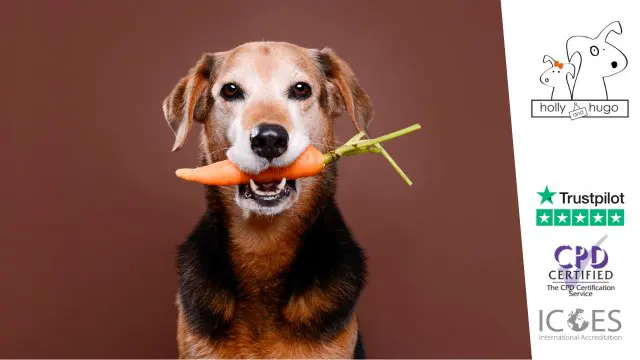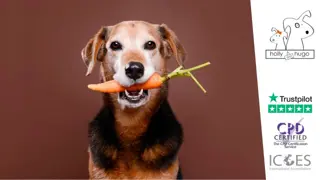
Accredited Pet Nutrition Course
CPD UK & ICOES Accreditation | 30 CPD Points | Buy this course and avail of a FREE one-month membership to 200+ courses
Holly and Hugo
Summary
- Proof of Completion - Free
- Certificate of Achievement - £18.99
- ICOES Digital Certificate - £23.99
- ICOES Certificate - Hard Copy - £29.99
- Continuing Professional Development (CPD) - £39.99
- Exam(s) / assessment(s) is included in price
Add to basket or enquire
Overview
You are what you eat - and that goes for animals too. Like us, they may prefer to gorge on treats rather than get the good stuff down. It’s our job to make sure our pets eat the right nutrients to keep them healthy, fit, and strong.
This course shows you what’s great and what’s not good for animals to eat, the diets of different animals, and their needs from dogs to terrapins. You'll start to understand different food groups, types of diets, and the importance of reading and understanding food labels by reading the small print.
CPD
Course media
Description
Learn what carnivores, herbivores, and omnivores like to eat and how their digestion differs. Discover the nutritional needs for when your pets are young, adult, and senior animals. Find out about their feeding habits, what to feed your pet to keep them healthy, and how often they should be fed. You'll also get tips on how to cope with faddy eaters.
In this course, you'll know what to do if your pet has a weight problem and, conversely, ways to encourage weight gain if need be. When your pet is sick or is diagnosed with a long-term condition, they could need a special diet to help build them up. You'll get to know about any allergies or intolerance to certain foods and hypoallergenic diets.
We all want to do what’s best for our animals, especially when it comes to what they eat. This course opens up all the options, so you can make an informed choice about their diet.
Course Syllabus
Module 1: Food Glorious Food
- 1.1 Food groups
- 1.2 Types of diet
- 1.3 Reading food labels
Module 2: Types Of Digestion
- 2.1 Herbivores
- 2.2 Carnivores
- 2.3 Omnivores
Module 3: Cradle To Grave Feeding
- 3.1 Puppies and kittens
- 3.2 Adults
- 3.3 The senior animal
- 3.4 Pregnancy and lactation
- 3.5 Feeding dogs
- 3.6 Feeding cats
- 3.7 Ad lib feeding vs mealtimes
- 3.8 How often to feed
- 3.9 Avoiding faddy eaters
Module 4: The Weighty Matter Of Weight
- 4.1 The importance of a healthy waistline
- 4.2 Does your pet have a weight problem?
- 4.3 Honey I shrunk the dog
- 4.4 A special mention about cats and diabetes
- 4.5 Safe weight gain
Module 5: Food And Ill Health
- 5.1 Dietary allergies and intolerance
- 5.2 Hypoallergenic diets
- 5.3 Cats and urinary blockages
- 5.4 Renal problems
- 5.5 GI upsets
- 5.6 Pancreatitis
- 5.7 Dental disease
- 5.8 Cancer, brain ageing, and liver disease
Module 6: Pet Food: Opening Pandora’s Box
- 6.1 Homemade diets
- 6.2 RMB
- 6.3 Supermarket foods
- 6.4 Premium pet foods
- 6.5 Veterinary approved foods
- 6.6 Changing diets
Module 7: Rabbits And Guinea Pigs
- 7.1 Myths and mistakes
- 7.2 Healthy eating for Rabbits and Guinea Pigs
- 7.3 Eating-related issues
Module 8: Mice, Rats, Gerbils, And Hamsters
- 8.1 Rats
- 8.2 Mice
- 8.3 Gerbils
- 8.4 Hamsters
Module 9: Birds
- 9.1 Avian Digestive Anatomy
- 9.2 Cage Birds
- 9.3 Poultry
- 9.3 Birds of prey
- 9.4 Parrots
Module 10: Fish
- 10.1 Overview of Fish Nutrition
- 10.2 Freshwater
- 10.3 Saltwater / Marine
Module 11: Reptiles
- 11.1 Tortoises
- 11.2 Terrapins and turtles
- 11.3 Lizards
- 11.4 Snakes
Who is this course for?
- Anyone who keeps any type of pet and needs to understand their dietary needs so they can provide the best possible care for them.
- People who work or volunteer with animals who would like to know what each animal should eat to stay healthy.
- Anyone looking for jobs with animals who will greatly benefit from understanding their nutritional needs and adding an accredited certificate course to their resume.
- People who love animals and want to understand more about them.
Requirements
Holly and Hugo courses are designed for anyone with an interest in learning. No formal qualifications are required. Our courses are suitable if you want to learn new skills, start a new career, or if you’re already working in a particular industry and wish to upgrade your talents and enhance your resume.
Career path
All courses are accredited by the International Council for Online Educational Standards (ICOES). After passing any exams and completing a course successfully, students can opt to purchase an ICOES certificate from the third-party institution.
Holly and Hugo is also CPD certified, meaning the courses meet or exceed Continuing Professional Development standards and benchmarks.
Questions and answers
Currently there are no Q&As for this course. Be the first to ask a question.
Certificates
Proof of Completion
Digital certificate - Included
Certificate of Achievement
Digital certificate - £18.99
ICOES Digital Certificate
Digital certificate - £23.99
ICOES Certificate - Hard Copy
Hard copy certificate - £29.99
Continuing Professional Development (CPD)
Digital certificate - £39.99
Reviews
Currently there are no reviews for this course. Be the first to leave a review.
Legal information
This course is advertised on reed.co.uk by the Course Provider, whose terms and conditions apply. Purchases are made directly from the Course Provider, and as such, content and materials are supplied by the Course Provider directly. Reed is acting as agent and not reseller in relation to this course. Reed's only responsibility is to facilitate your payment for the course. It is your responsibility to review and agree to the Course Provider's terms and conditions and satisfy yourself as to the suitability of the course you intend to purchase. Reed will not have any responsibility for the content of the course and/or associated materials.



